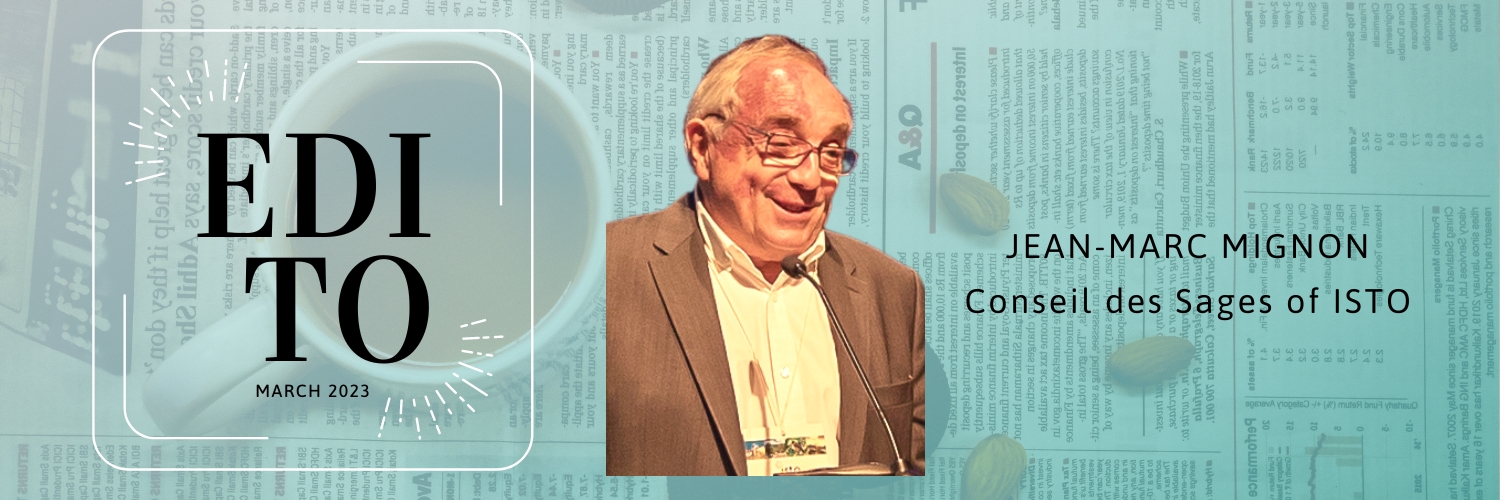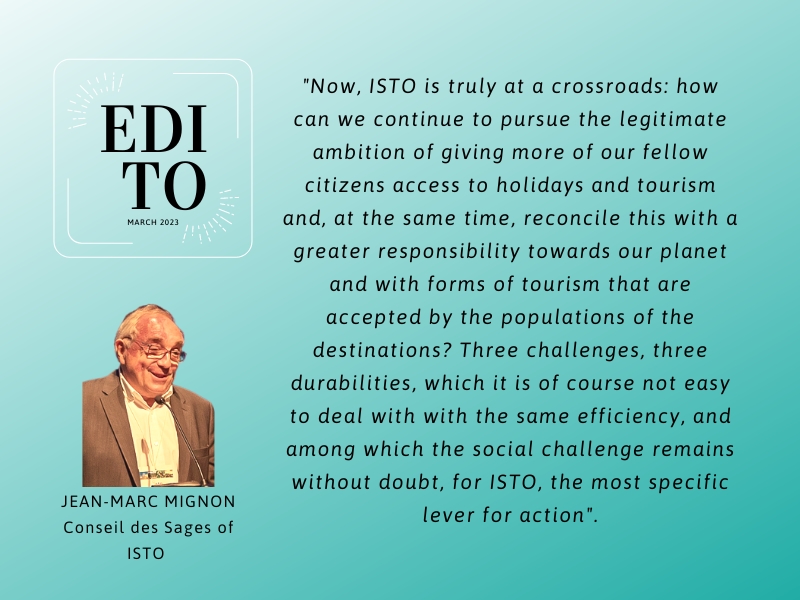This new year 2023 will see ISTO celebrate 60 years of existence. This is a significant milestone and few international organisations in the tourism sector can be proud of such longevity.
But, of course, the question that immediately comes to mind is what we actually want to celebrate: is it 60 years of social tourism, is it the emergence of forms of responsible and fair tourism - very well described by our vice-president and friend Maurizio Davolio in his editorial of December 2022 -, is it something else again... or is it not actually our Organisation itself, through its history and its commitments?
The purpose of this editorial is not to recount in detail the history of the Bureau International de Tourisme Social (B.I.T.S.), from its creation in 1963 until the Rimini Congress in 2010, when it was renamed O.I.T.S./I.S.T. O, to keep only the acronym ISTO today; it is more a question of recalling what was the meaning of the commitment of several generations of leaders of tourism organisations and activists and to envisage the meaning to be given to the future action of ISTO.
How long ago it was when, in 1897, the Canadian watercolourist Maurice Prendergast painted a canvas entitled "Summer visitors" by the sea, a period followed by social conquests which, after the Second World War, allowed the blossoming of what was then called "popular" tourism, which became "social" tourism at the time of the creation of the BITS. It is based on the ambition of our founders to contribute to the development of this tourism for all that our Organisation has constituted and transformed over the years, this objective remaining central since we are still far from the goal on an international scale.
In various countries of Europe and the Americas, the public authorities have played a major role in instigating social tourism policy programmes or mechanisms, just as operators, mainly from the associative or cooperative sectors, but not exclusively, have proposed a diverse and affordable holiday offer. For decades, the BITS/ISTO has endeavoured to promote this ambition of a tourism accessible to the greatest number of people at the international level, and in particular within the World Tourism Organisation, where, at the end of the 1990s, our contribution to the elaboration of the World Tourism Code was far from negligible.
This led our organisation to clarify its vision of social tourism and tourism in general through its main reference text, the Montreal Declaration "Towards a Humanist, Social Vision of Tourism", adopted in 1996 and enriched in 2006, which has lost none of its relevance.
Naturally, this quest for meaning led ISTO to open up to responsible and fair tourism operators and to welcome them formally at the Zagreb congress in 2016.
This evolution, which could continue in the future with other partners sharing our values, has led to the renewal of ISTO's membership, with departures or disappearances of old members, but also the arrival of new members marking a greater diversification, notably geographical, since we are now present on the 5 continents, with 168 members and 20 academic researchers from 46 countries.
But today, another absolutely major challenge is facing us, as well as the whole world of tourism... and the whole international community: it is of course the climatic and environmental issue. Both science and the major climate disruptions of recent years have opened our eyes to the consequences of all our actions, our consumption patterns, and therefore, obviously, our way of spending our leisure time and travelling.
Now, ISTO is truly at a crossroads: how can we continue to pursue the legitimate ambition of giving more of our fellow citizens access to holidays and tourism and, at the same time, reconcile this with a greater responsibility towards our planet and with forms of tourism that are accepted by the populations of the destinations? Three challenges, three durabilities, which it is of course not easy to deal with with the same efficiency, and among which the social challenge remains without doubt, for ISTO, the most specific lever for action. In this respect, the Observatory project submitted to the European Commission as part of a consortium could be a valuable tool if it is selected. Relying more on the actors of the world of work and their representatives could also reinforce this ambition of ISTO.
The fact that the majority of social tourism schemes and programmes are offered at the national level is undoubtedly a major point for our sector and our organisation, as well as the fact that the fair trade and responsible travel of our members is based on strict criteria of duration, respect for the environment, and positive encounters…
This is why, in our opinion, ISTO, far from having the somewhat decadent vision of tourism that it was unjustly accused of having at one time, is, with its African, American and European sections, the international organisation best able to find ways of creating a much more meaningful form of tourism, in which we do not forget the strong inequalities between continents and countries, between the relatively well-off and the more underprivileged classes. It is also within this group that, for example, with the support of members of the Alliance for Training and Research, an in-depth reflection is being carried out on the role of tourism organisations in terms of gender equality, or that we are working to make tourism accessible to people with disabilities.
The dynamic and multifaceted way of celebrating this anniversary, chosen by our President, Isabel Novoa, the Executive Committee and the ISTO team will undoubtedly show the richness of our collective contribution.
The way forward is certainly narrow, and it would be pretentious to think that we can find solutions alone, nor without profoundly questioning our lifestyles and without greater sobriety...
But, to use the words of the Brazilian indigenous leader Benki Piyako, whom we welcomed at the Lyon Congress in 2018, let us hope and trust that ISTO will be, in the field of tourism, and with others, an "awakener of conscience" and a pioneer of solutions aimed at the general interest.
A very happy 60th anniversary to ISTO and all its members.
Jean-Marc Mignon
Representing the Conseil des Sages

